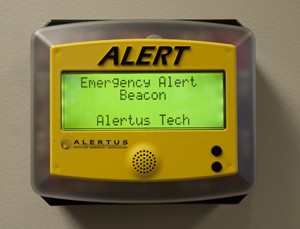
The university is adding new features to its WUSTLAlerts emergency notification system this spring to help the WUSTL community stay informed and safe during an emergency.
Alertus beacons, pop-up messages on university-owned computers, digital signage- and cable TV-overrides, and public address system access are among this spring’s improvements.
“These enhancements to our WUSTLAlerts emergency notification system will greatly expand our reach of contacting our university community quickly in times of crises,” says Mark Bagby, emergency management coordinator. “It also opens the door for us to connect to other notification technologies in the future.”
Alertus beacons
Yellow Alertus beacons were installed this past fall to help warn community members of an emergency while they may be away from their computers, not checking cellular phones, or in locations where they are unable to hear emergency sirens.
Beacons now are located in various large gathering spaces, common areas and classrooms across the university. Beacon locations include the lobby of the Athletic Complex, the Bear’s Den and Whisper’s Café in Olin Library on the Danforth Campus; the Farrell Learning & Teaching Center first floor and Bernard Becker Medical Library circulation desk on the Medical Campus; and receptions areas at North and West campuses.
When activated during an emergency, the beacon will light up, emit a loud tone and display a message about the nature of the emergency on its LCD screen.
To acknowledge the warning and silence the beacon, press both black buttons on the bottom right-hand corner of the beacon at the same time. The beacon will continue to light up and display the message on its screen.
Computer pop-up messages
Another addition to WUSTLAlerts is pop-up warnings on many university-owned computers and laptops.
Once the pop-up software is installed, the software will cause a message to pop up on the computer’s screen in an emergency. After the computer’s user acknowledges that he or she has seen the message, the computer will return to normal, and no data will be lost.
This software will be installed on university-owned computers and laptops by IT staff this spring on an ongoing basis based on departmental approval.
Cable TV- and digital signage-overrides
For those subscribed to Danforth Campus Cable TV — Danforth Campus residence hall occupants and some departments and buildings on the Danforth Campus — WUSTLAlerts will take over part of the screen to display an emergency message. A message will not display if a gaming system or DVD player is being used at the time of the emergency.
Another enhancement planned is digital signage-overrides. For areas with digital signage that uses Four Winds software, WUSTLAlerts will be able to take over the screen with an emergency message.
Public address
WUSTL has added voice-message capability to the university’s outdoor warning sirens, which are located on Brookings Hall, Seigle Hall and Nemerov House. The sirens now can loudly sound and then broadcast the nature of the emergency.
The same emergency message broadcast by the sirens also will be broadcast by public address systems in the Danforth University Center, Olin Library and the Athletic Complex to alert the WUSTL community to an emergency.
Other WUSTLAlerts features
These improvements supplement the university’s current WUSTLAlerts system, which includes emergency sirens, an emergency website and hotline, and an emergency messaging system that sends alerts to phones and computers via text message and email.
“Text messaging has proved to be an effective and efficient way to reach members of a university community in a crisis,” says Matt Arthur, director of incident communications solutions. “It’s vital that each WUSTL student, faculty and staff member visit emergency.wustl.edu and update their contact information.”
WUSTL community members are strongly encouraged to register their cell phone numbers with the university so they can receive emergency text and voice messages on their cells phones. To sign up, visit emergency.wustl.edu.
For more information about WUSTLAlerts, email Bagby at bagbym@wustl.edu.
An update about how WUSTL will communicate tornado warnings for St. Louis City and County will appear next week.